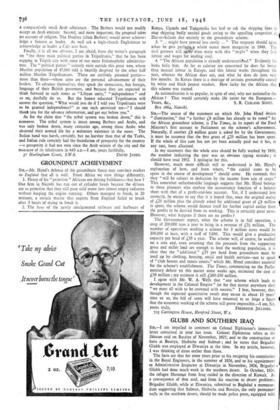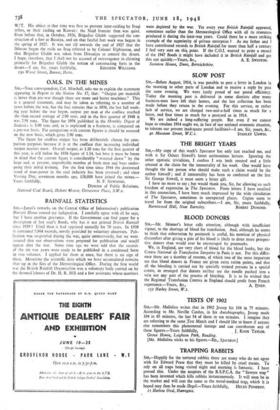GLUBB AND SOUTHERN IRAQ
Stit,—I am impelled to comment on Colonel Elphinston's interesting letter contained in your last issue. Colonel Elphinston refers to the Ikhwan raid on Busaiya of November, 1927, and to the construction of forts at Busaiya, Shabicha and Sulman ; and he states that Brigadier Glubb was employed at Diwaniya at the time. In my article, however, I was thinking of dates earlier than those.
The facts are that for some years prior to his resigning his commission in the Royal Engineers, in the summer of 1926, and to his appointment as Administrative Inspector at Diwaniya in November, 1926, Brigadier Glubb had done much work in the southern desert. In October, 1926, the refugee Shaming from Iraq raided in the direction of Kuwait. As a consequence of that raid, and from his reaction to desert problems, Brigadier Glubb, while at Diwaniya, submitted to Baghdad a memoran- dum suggesting that Sulman, Shabicha and Busaiya, the only permanent wells in the southern desert, should be made police posts, equipped with
W/T. His object at that time was first to prevent inter-raiding by Iraqi tribes, or their raiding on Kuwait: the Najd frontier then. was quiet. Even before that, in October, 1926, Brigadier Glubb suggested the con- struction of a fort at Busaiya, and on that fateful fort work was begun in the spring of 1927. It was not till towards the end of 1927 that the Ikhwan began the raids on Iraq referred to by Colonel Elphinston, and that Brigadier Glubb was taken from Diwaniya to control the desert. I hope, therefore, that I shall not be accused of extravagance in claiming primarily for Brigadier Glubb the notion of constructing forts in the desert.—I am, Sir, yours faithfully, KENNETH WILLIAMS. 130 Wood Street, Barnet, Herts.



































 Previous page
Previous page